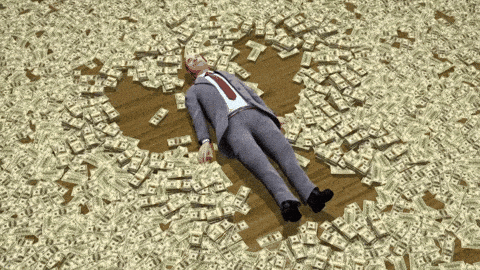- Skills School Forgot
- Posts
- Money Monday | What is a Dividend?
Money Monday | What is a Dividend?
Learn about the magic of dividends. This "free money" is how companies pay you just for owning their stock
Magically Make Money Doing Nothing
What if I told you there was a way to make money by doing absolutely nothing? No, this isn’t a pyramid scheme I’m pitching, I’m talking about dividends. Dividends are a beautiful payment you receive simply for having ownership in a business. Many, but not all, stocks will pay you every quarter just for owning shares of their company. Let’s learn how. Enjoy!
What are Dividends?
A dividend is a “cash” distribution to company shareholders. This is fancy lingo for money you receive from a company when owning shares. Even owning one share of company stock means you’re entitled to dividends if they are paid. Dividends are typically paid once a quarter although some companies choose to pay monthly or annually. Another dividend option is called a “special dividend” meaning the company will pay a cash dividend to shareholders on random occasions (every couple of years).
Dividend payments are decided by a company’s Board of Directors. In order to keep the finances in check, the board makes the final decision on the amount of the dividend payment.
Example:
Apple Inc. (AAPL) currently pays a $0.96 per share dividend per year. They pay this yearly dividend every quarter in the sum of $0.24 per share. This means that if you owned 100 shares of apple, you would receive $24 per quarter just for owning the company.
The dividend per share normally goes up every year increasing payouts over time. For example, in 2019, Apple Inc.’s dividend was $0.19 per quarter.
Dividends and Stocks
Many U.S. stocks pay their shareholders a dividend. The most common dividend paying stocks are in industries like Utilities, Banking, Healthcare, and Oil. Exxon Mobile, JP Morgan Chase, and Duke Energy are all examples of dividend paying companies. Remember, dividends aren’t only paid by public companies, privately owned companies pay dividends as well.
Important Dividend Dates
Announcement Date: This is the day a dividend is announced. A dividend will need to be approved after it has been announced making this date the first in a longer process.
Ex Dividend Date: The final date you need to own stock in order to qualify for the dividend. If the Ex-Dividend date is June 2nd, you’ll need to be an owner on June 1st or before in order to receive the dividend.
Payment Date: Dividends are paid to shareholders two weeks to a month after the ex-dividend date. This means if you owned the stock prior to the ex-dividend date, you would receive your cash about 2-4 weeks after the ex-date.
Dividends Affecting a Stock Price
If a company pays a $1 dividend, their stock price will decrease by $1 on the ex-dividend date. This is to account for the $1 payment, per share, a company is paying out. On the ex-dividend date, a stock’s price per share will decrease by the amount of the dividend being paid.
Why Do Companies Pay a Dividend?
When a business is profitable, there are a couple of paths the executives can take. A young company will want to take the profits and expand the business. It may buy more stores, more products, hire more employees, or invest in a larger factory. However, for a mature company, growth and expansion become more difficult. Their services may have reached their maximum potential, or their products may have reached the entire market.
When growth stalls for a company it is usually considered “mature”. Mature companies are common candidates to pay a dividend. These businesses still turn a profit, but there is no better investment than to pay the shareholders some cash. This is why older businesses usually pay a dividend when their growth slows down.
Know Someone Who Would Love This?
The link below will take you to the magical land of learning also known as the landing page. If you were forwarded this email, you can receive this daily newsletter tomorrow by clicking that blue button below and sharing your email address.



